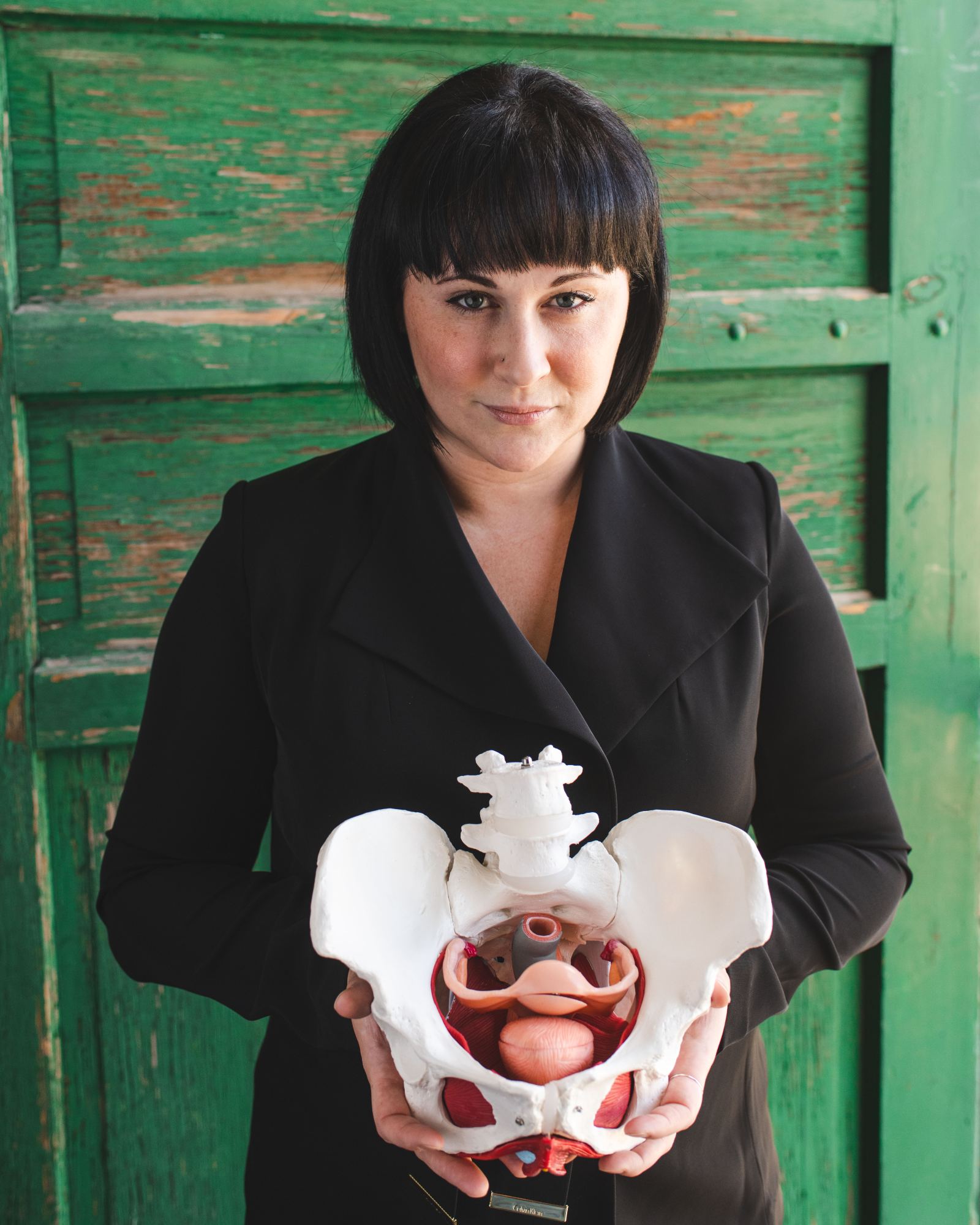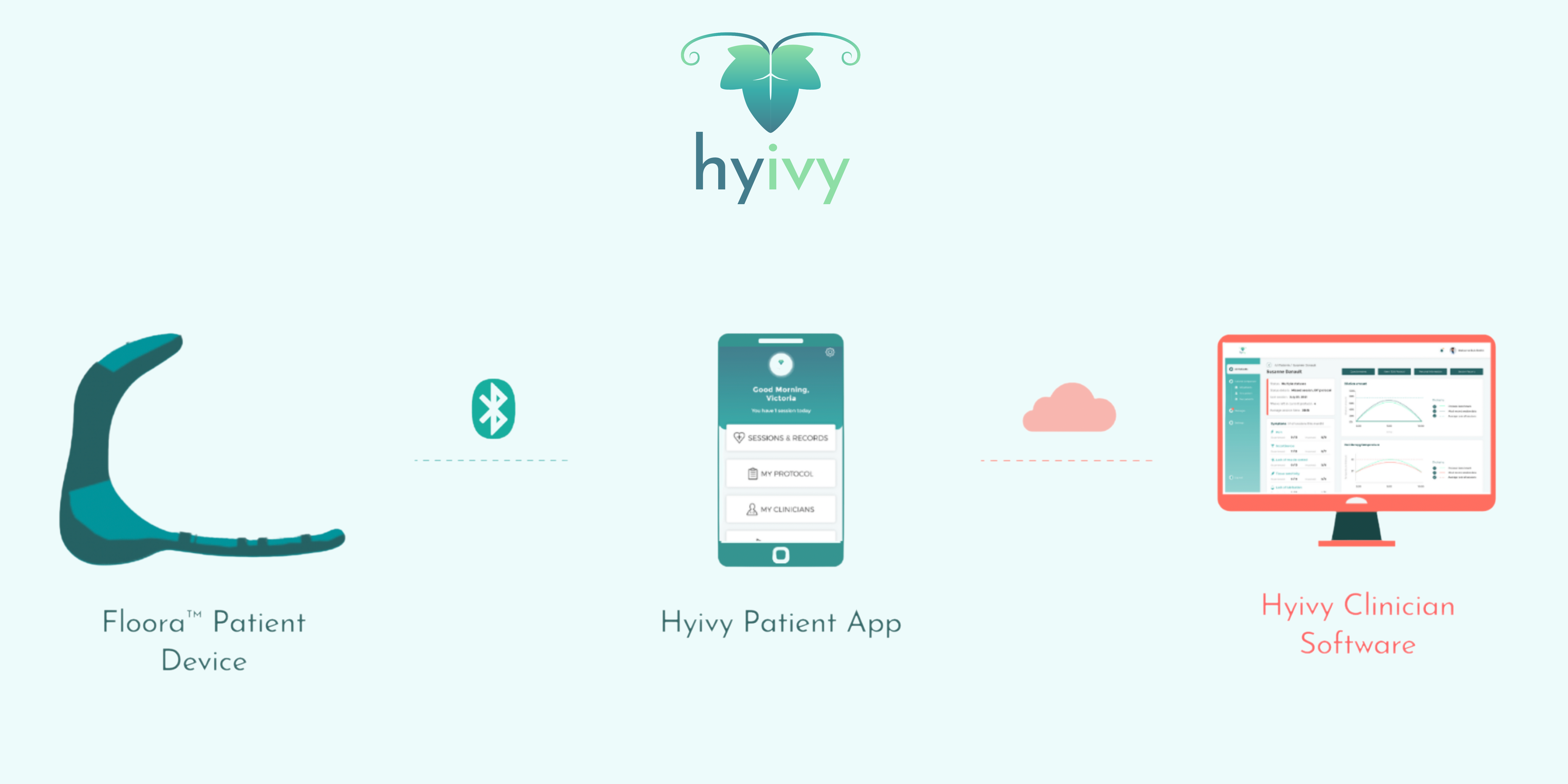Following her cancer diagnosis, founder Rachel Bartholomew is shaping the future of women’s health care by bringing the next generation of pelvic rehabilitation to market.
Pop quiz: What is pelvic floor dysfunction?
If you’re not sure, you’re not alone. The muscle and nerve condition—essentially, the inability to control the muscles of the pelvic floor—is woefully misunderstood by health care providers and the average person. At least a third of women will experience PFD in their lifetime, causing them to suffer from a constellation of symptoms including urinary urgency, incomplete emptying of the bladder and bowels, chronic inflammation of the hip, lower back, and pelvis, and sexual dysfunction that makes penetration painful, if not impossible.
The prevalence of these oft-unspoken issues, and the startling lack of products and services available to help manage them, is something Rachel Bartholomew, a Waterloo-based tech entrepreneur, noticed and used as the impetus for Hyivy Health, her “down there” medical device company. Her own experience with a hypertonic (abnormally tight) pelvic floor brought on by radiation treatment for her cervical cancer—and the vaginal dilator her oncologist recommended to help deal with it—served as added incentive to take the reins herself.
A vaginal dilator, for the unversed, is a tube-shaped device made of silicone or hard plastic that’s used to progressively (and often painfully) stretch vaginal tissues. It was introduced [by a man] almost a century ago with precious little innovation or updates to the design since then. In her own research, Bartholomew learned that less than a quarter of people who use dilators continue with them after a year. “I just couldn’t believe that my fate was going to be in this crappy 85-year-old technology,” she says (albeit with more colourful language). “Something needed to be done.”

Rachel Bartholomew, CEO, Hyivy
Vaginal dilators: in need of disruption
In 2020, Bartholomew launched Hyivy with a clear mission in mind: raise the bar on pelvic health care by radically overhauling the way pelvic floor symptoms are treated. To do that, Hyivy (pronounced “Hi-Ivy,” a fusion of hysterectomy and an ivy leaf, for its resemblance to a uterus), is developing the first-ever holistic, patient-centred pelvic floor rehabilitation system that consists of both therapeutic hardware and cutting-edge software components.

A vaginal dilator for the digital age: Hyivy’s Floora device pairs with an app for patients and their clinicians to connect virtually and track progress.
In engineering the Floora wand, Bartholomew took into account all of the ideas and feedback she got from her oncology team (fun fact: she pitched her concept to her radiologist while strapped to a radiation machine), plus countless medical experts, therapists, clinicians, and cancer patients she initiated conversations with while in treatment. The result? Something that’s easy to hold, fits the ergonomics of the vaginal environment, self-lubricates, and integrates thermal therapy to warm and cool the muscles and ease inflammation as needed. It also uses an air inflation approach to ever-so-gently stretch vaginal tissues by as little as a millimetre, in contrast to the half-inch stages traditional dilators offer.
Outfitted with pressure sensors, the made-in-Canada device pairs with a mobile app that provides real-time data to the patient and their clinician, letting them track progress and connect virtually. While ongoing clinical testing and regulatory approvals means that it’s yet to make it to market, the hope is that the system will make pelvic floor physiotherapy, which can be expensive and hard to access in rural areas, something that people can complete in the comfort of their homes.
“I want to rethink the way that we approach pelvic therapies altogether so that it isn’t so inhumane.”
“I’d love to make a huge improvement on what’s currently out there, introduce new things, make it easier and make it a better experience,” says Bartholomew. “I just want to rethink the way we approach our therapies altogether so that it isn’t so inhumane.”
Empowering women through knowledge
If Team Hyivy approaches problems as women, they solve them as data scientists. Research, testing, clinical trials, user feedback, insights, and analysis are the backbone of everything that they do, and with the sheer lack of previous studies conducted on women’s health, Hyivy is working to fill the critical void. “I didn’t realize how far behind we were in understanding what patients go through,” says Bartholomew, pointing out that women were not even required to be included in clinical trials in Canada until 1997 (and 1993 in the U.S.).
Ultimately, the data piece has become her driving force. “The stuff that we’re seeing has never been measured or studied before; it gets me so excited that we’re basically unlocking the keys to the vagina universe,” she says. “My hope is that I can use our research to say, ‘hey, Harvard, MIT, you guys are creating something. Here’s some information. Hopefully, this helps.’ I want to be able to share it openly to keep moving things forward.”
Privacy and security as pillars
If all of this data sharing and remote tracking sounds concerning, Bartholomew has thought of that, too. The rise of cyber attacks and digital surveillance globally, not to mention the fraught nature of reproductive privacy protections related to abortion access in America, has forced Hyivy to place paramount importance on user privacy, while ensuring that sensitive health data remains confidential and secure. “We’ve wiped clean all of our administration data so that we can protect our Roe v. Wade girls in the States,” she explains. “That way we can’t get called to send personal user data to some U.S. Senator; it’s designed to be shared only with their doctor so that they can actually see what’s happening.”
The funding hurdles femtech companies face
With Bartholomew working to make her product above reproach, and the topic slowly creeping into the mainstream (“pelvic care” has seen a 62 per cent rise in Google searches since 2018, and the hashtag #pelvicfloortherapy boasts over 385 million views on TikTok), you might be wondering where are all the startup investors? After all, global investments in femtech, an industry that encompasses software, devices, and services to focus on women’s health, could more than double from $47 billion USD last year to over $108 billion USD by 2032, reports Canada/India based Precedence Research.
Female tech startup founders, however, have a notoriously hard time securing outside investment. Just 10 per cent of VC deals in Canada have gone to women-led startups since 2014. The disparity is due in part to the fact that female investors aren’t at the table. Reports indicate that women are twice as likely to invest in women-led startups, but account for only 19.4 per cent of cheque-writers in Canada. “We’re 51 per cent of the population, yet I’m constantly having to explain why we’re not a niche market,” says Bartholomew, who last year founded Femtech Canada, a hub to mobilize resources, drive awareness, and foster a collaborative community within the women’s health innovation sector. “It still shocks me that this is the conversation we’re having.”
“We’re 51 per cent of the population, yet I constantly have to explain why we’re not a niche market. It still shocks me that this is the conversation we’re having.”
In pitching her startup to investors, Bartholomew finds that the uber-male VC world often struggles to understand the value proposition or the scale of the problem and opportunities—not to mention the intricacies of female anatomy. “The pelvic floor is so stigmatized, it’s a hard piece to overcome,” she explains. “I spend a lot of time educating VCs and talking to their wives or daughters who get brought in to help them understand and validate why this is important.”
Despite myriad obstacles, Bartholomew hasn’t been put off by the funding challenges. “Cancer teaches you to be resilient and I think that’s the biggest piece: I wouldn’t take no for an answer,” she pronounces. “Even when I got a no, I moved on to the next and didn’t wallow in it. I think it took us about sixty no’s to get to our first yes.”
The investment: pairing with the right partners
That first big yes came in the form of a cool $1.1 million in pre-seed funding. In December 2021, a slate of top tier VCs, including The51, OCI, iGan, Zambon Research Venture, Threshold Impact, Equation Angels, Beresford Ventures, and the University of Waterloo’s Velocity program, all participated in the oversubscribed round, along with a number of individual angel investors.
Ross Robinson, VC and General Partner at Velocity Fund (an RBCx partner), was “thrilled” to bring Hyivy into their portfolio: “We found this investment so compelling as we came to understand the staggering need for better solutions in pelvic floor rehabilitation, both in terms of numbers and in terms of impact on people’s quality of life. When you see a founder’s work having such an impact on their customers and on the community, it’s easy to invest.”
RBCx, for its part, is also a believer in Bartholomew’s vision, providing specialized banking products and services for her Canadian and U.S. operations. “The things that RBCx has done to support us in our progress have been so substantial,” she says. “Not just in unlocking access to financial resources and working capital, but it’s also the coaching and introducing us to the right people. We’re still a baby company. We’re still growing and maturing. I like to say, we’re like a toddler falling flat on our face and we’re slowly starting to learn how to walk. But we’re going to get there, and I’m excited to see what RBCx can do with us moving forward from here.”
The future is female
Flush with venture capital, Hyivy has been able to move forward on several fronts: opening offices in the U.S. and U.K.; pursuing Class 2 Device regulatory approvals from Health Canada the FDA; refining the manufacturing and production quality; safety testing and ISO certification; and clinical trials with McMaster University and Grand River Regional Cancer with a dozen more in the pipeline, including ongoing discussions with hospitals across North America and across the pond.
If everything goes according to plan, she says, we’ll see Hyivy certified as a medical device and out in the world as early as next year.
Until then, Bartholomew remains laser-focused on the future and unyielding in her determination to make a difference in women’s lives. “I can’t have kids anymore. I lost my fertility during my cancer. It was a hard piece to swallow, but I’m lucky that I can swipe some of that stuff off my personal plate. Hyivy is my baby. This has become my life journey. I get to commit all my time to it, and then the other half of my time I commit to myself.”
To learn more about Hyivy Health, visit Hyivy.com.
RBCx offers support to startups in all stages of growth, backing some of Canada’s most daring tech companies and idea generators. We turn our experience, networks, and capital into your competitive advantage to help you scale and make a meaningful impact on the world. Speak with an RBCx Advisor to learn more about how we can help your business grow.
